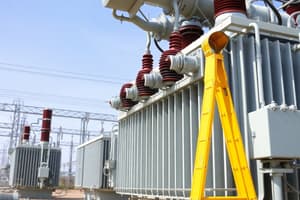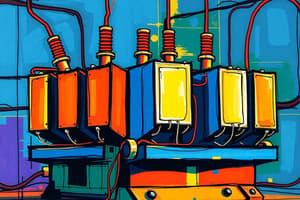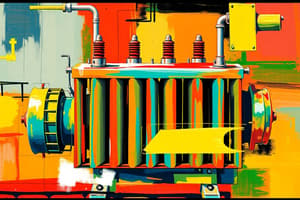Podcast
Questions and Answers
What is the purpose of instrument transformers?
What is the purpose of instrument transformers?
- To disrupt the circuitry
- To measure electrical quantities without disrupting the circuitry (correct)
- To increase heat build-up in the unit
- To prevent dirt accumulation on external surfaces
Which of the following is NOT a specialized form of transformers mentioned in the text?
Which of the following is NOT a specialized form of transformers mentioned in the text?
- Step-down transformers (correct)
- Autotransformers
- Step-up transformers
- Isolation transformers
Why is cleanliness important for transformer maintenance?
Why is cleanliness important for transformer maintenance?
- To damage the core condition
- To disrupt the circuitry
- To increase heat build-up inside the unit
- To prevent dirt accumulation and reduce heat build-up (correct)
What is a key aspect of transformer maintenance related to inspection?
What is a key aspect of transformer maintenance related to inspection?
Why are timely repairs important in transformer maintenance?
Why are timely repairs important in transformer maintenance?
Which of the following statements is true about transformers?
Which of the following statements is true about transformers?
What is the primary purpose of transformers in electricity management?
What is the primary purpose of transformers in electricity management?
Which winding in a transformer is connected to the source of power?
Which winding in a transformer is connected to the source of power?
What is the function of iron cores in transformers?
What is the function of iron cores in transformers?
Which type of transformer contains insulating oil to isolate short circuits?
Which type of transformer contains insulating oil to isolate short circuits?
What are power transformers specifically designed for?
What are power transformers specifically designed for?
Which component in a transformer takes power from high-voltage lines and brings it down to the core for energy storage?
Which component in a transformer takes power from high-voltage lines and brings it down to the core for energy storage?
Study Notes
Transformers
Transformers play a crucial role in managing electricity by converting electrical power from one voltage level to another. They are devices used primarily to change AC voltages from high levels to low levels and vice versa, often found in substations. There are two main components involved when using transformers—the primary winding which has a lower number of turns and is connected to the source of power, and the secondary winding with many more turns than the primary winding, providing a higher output voltage.
Construction of Transformers
The construction of transformers involves several key parts:
-
Windings: These consist of coils of wire wound around cylindrical iron cores through which current flows.
- Primary windings take power from high-voltage lines and bring it down to the core of the machine where energy is stored magnetically.
-
Iron Cores: Made up of soft iron laminates, they serve to focus magnetic fields and decrease energy losses due to eddy currents.
There are essentially three different types of transformers based on their design:
- Dry type transformers contain insulating material between the layers of laminated steel sheets while oil filled transformers have insulating oil to isolate short circuits.
Types of Transformers
Different kinds of transformers exist depending on how they work:
- Power transformers are designed to transfer large amounts of electric power efficiently over transmission lines.
- Instrument transformers are smaller transformers used for measuring electrical quantities such as voltage and current without disrupting the circuitry.
Aside these basic categories, there are also specialized forms like autotransformers, isolation transformers, and step-up transformers.
Maintenance of Transformer
Regular inspection and proper care of transformers ensures safe operation and longevity. Some key aspects of maintenance include:
- Cleanliness: Regularly cleaning vents, cooling fins, bushings, and other areas helps reduce heat build-up inside the unit and prevents dirt accumulation on any external surfaces.
- Inspection: Monitoring temperatures, wiring conditions, fluid quality, and core condition can help identify potential issues early on.
- Repairs: If any damaged elements are detected during routine checks, timely repairs must be performed to prevent further damage.
In conclusion, understanding the basics of constructing, categorizing, and maintaining transformers is essential for anyone dealing with electrical systems, whether they're working with residential or industrial installations.
Studying That Suits You
Use AI to generate personalized quizzes and flashcards to suit your learning preferences.
Description
Learn about the construction, types, and maintenance of transformers, essential devices in managing electricity by transforming AC voltages from high to low levels and vice versa. Understand the components involved, such as windings, iron cores, and the importance of regular inspection and proper care for safe operation.





